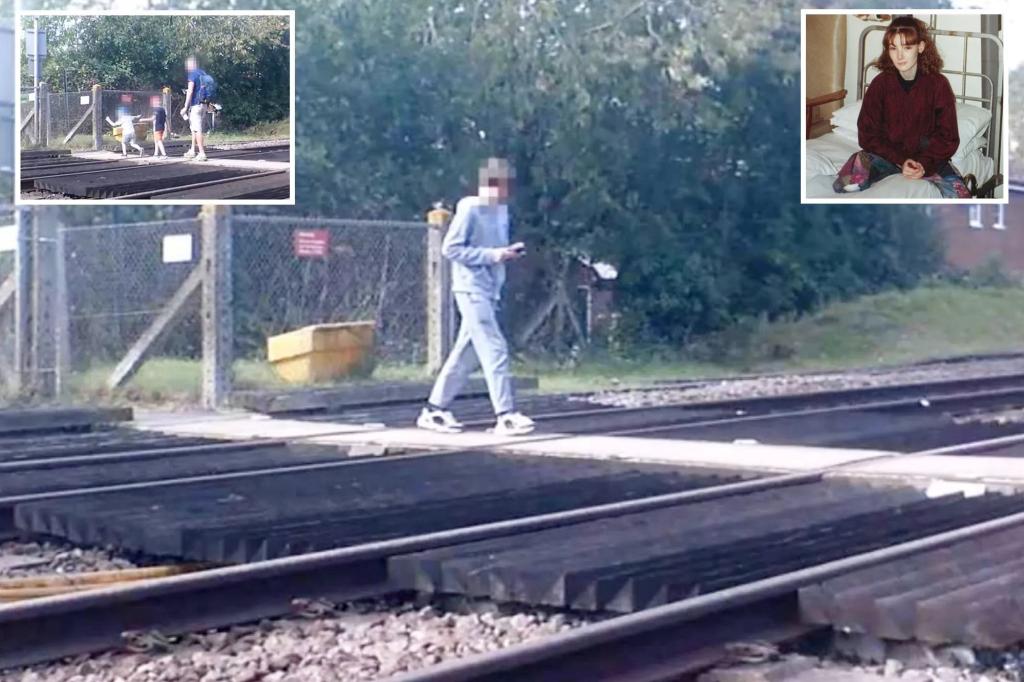Gen Z and Millennials are the most likely age groups to be hit by trains because they are distracted by their phones, experts have warned.
Network Rail have released a shocking CCTV montage showing people risking their lives on the train tracks.
In one chilling clip a teenage boy is seen standing on the lines while gazing at his mobile, just moments before a train passes.
Another clip shows a young dad walking two children across the tracks while utterly absorbed by his hand-held device.
It comes as new data reveals nearly half of people (47 percent) admit they’ve made a mistake while being distracted by their phone.
Young people are among the most distracted, with 87 percent of Gen Z and 70 percent of Millennials admitting to phone-related mishaps.
Generation Z refers to people born between 1997 and 2012 while Millennials were born between 1981 and 1996.
Mobile phones are a major cause of distractions, impacting young people the most.
The study shows Gen Z are six times more likely to have an accident as a result of being distracted by their phones than older people.
Research shows 47 percent of Gen Z had walked into something, or someone, because they were looking at their device.
Meanwhile just seven per cent of Boomers – people born between 1946 and 1964 – had bumped into someone while on their phone.
Over the past four years, there have been 1,574 recorded near miss incidents involving pedestrians at level crossings.
Over that same period, incidents have increased on average by 16 per cent from April to May.
Network Rail have released shocking footage showing some of the worst offenders over the last 12 months.
In one video a cyclist ambles across a train line before being forced to scramble to the other side as a train thunders towards him.
As the lucky biker narrowly misses being wiped out, he even waves to the driver of the locomotive as it hurtles past.
A couple are also caught on camera pushing a pushchair across a level crossing despite the barriers to trains being raised.
The couple, who also had a dog on a lead, can be seen running across the tracks while chatting to each other.
A woman who lost a leg when she was hit by a train as a teenager is now fronting a campaign warning of the perils of level crossings.
Lucy Ruck was just 17 when she was struck by a high-speed train at Farnborough North level crossing in Hampshire in 1992.
She was hit so hard her leg was found half-a-mile up the track.
The mom-of-two is now warning people not to ignore lights or run across rail tracks.
Reliving the day of her accident, Lucy, now 49, said: “I got the train to Farnborough North in Hampshire every day for a year.
“I got off the train and waited at the level crossing gate which had traffic lights. It was red because my train was still in the station.
“As the train left, about five other people opened the gate, passed me and started walking across the track. The light was still red.
“I wasn’t reckless or in a rush but I went with the flow of the people traffic – like a sheep, I went with everyone else.”
But Lucy, who now lives in Warrington, did not realise her train was hiding a locomotive speeding towards her at 65mph from the opposite direction.
She said: “I was halfway across the track and literally in front of my nose was the train.
“I threw myself back, my left leg went out behind me and my right leg slipped out in front.
“It was found half a mile up the track.
“The consequences of a split-second decision can be life-altering. I know this all too well from my own accident.
“I wasn’t being deliberately reckless or rushing, but perhaps because I used the station every day and knew it so well, I’d become a bit complacent.
“I went with everyone else without stopping to think for myself. Remember, no appointment or destination is worth risking your life for.
“Always look carefully and never assume it’s safe to cross. It’s better to be late in this world, than early in the next.”
The research also found over two fifths of people (41 per cent) admitted they were more careful on roads than level crossings.
Thomas Desmond, Operations Director at Network Rail, said: “Whether it’s glancing at a phone or simply assuming the track is clear, these lapses in concentration can be fatal.
“We urge everyone to stop, look, listen and obey the signals every single time. Waiting a few minutes is infinitely better than risking everything.”
Gemma Briggs, a Professor of Applied Cognitive Psychology at the Open University, said: “While you may feel able to multitask when using your phone, research shows you can fail to notice important events and hazards which happen right in front of you.
“You don’t notice them because your mind is on your phone, and your attention is spread too thinly.
“This ‘inattentional blindness’ is particularly problematic in safety critical situations such as at level crossings.
“The best course of action is to put your phone away and focus your full attention on crossing safely.”
Read the full article here







